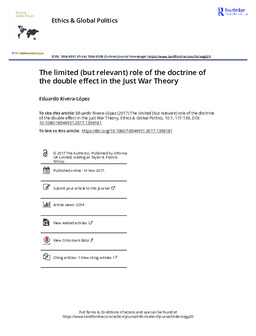The limited (but relevant) role of the doctrine of the double effect in the Just War Theory
Metadata
Show full item recordAuthor/s:
Rivera-López, Eduardo
Date:
2017Abstract
My focus in this paper is the use of the doctrine of double effect (DDE)
in the context of Just War Theory. Different versions of DDE have
different degrees of plausibility. Two distinctions are crucial. First, I
distinguish between epistemically idealized and non-idealized scenarios.
Second, I distinguish between versions of DDE that make a ceteris
paribus comparison between intentional and non-intentional outcomes,
from versions that either make a comparison that is not ceteris
paribus or are non-comparative. After undertaking these classificatory
tasks, I defend the following claims: First, in an idealized world, ceteris
paribus versions of DDE are plausible. Second, we cannot transfer such
plausibility to stronger (non-ceteris paribus) versions of DDE. Finally, in
a non-idealized world, DDE is plausible. The argument for this last
claim combines the reasons for defending ceteris paribus versions of
DDE in idealized circumstances with an argument about how to
proceed when we face hard choices under uncertainty.

